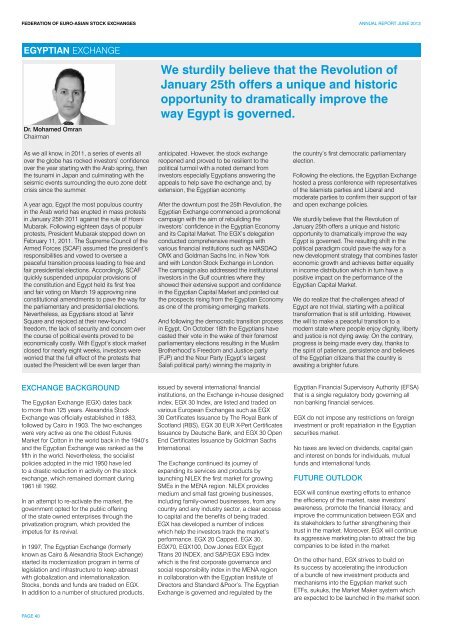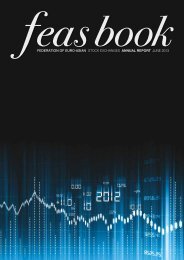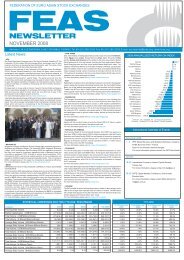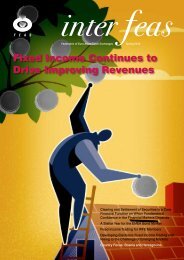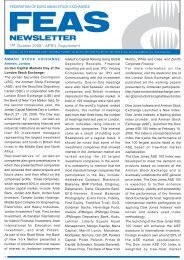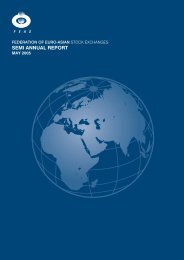JUNE 2013 - FEAS
JUNE 2013 - FEAS
JUNE 2013 - FEAS
You also want an ePaper? Increase the reach of your titles
YUMPU automatically turns print PDFs into web optimized ePapers that Google loves.
FEDERATION OF EURO-ASIAN STOCK EXCHANGES ANNUAL REPORT <strong>JUNE</strong> <strong>2013</strong><br />
EGYPTIAN EXCHANGE<br />
Dr. Mohamed Omran<br />
Chairman<br />
We sturdily believe that the Revolution of<br />
January 25th offers a unique and historic<br />
opportunity to dramatically improve the<br />
way Egypt is governed.<br />
As we all know, in 2011, a series of events all<br />
over the globe has rocked investors’ confidence<br />
over the year starting with the Arab spring, then<br />
the tsunami in Japan and culminating with the<br />
seismic events surrounding the euro zone debt<br />
crisis since the summer.<br />
A year ago, Egypt the most populous country<br />
in the Arab world has erupted in mass protests<br />
in January 25th 2011 against the rule of Hosni<br />
Mubarak. Following eighteen days of popular<br />
protests, President Mubarak stepped down on<br />
February 11, 2011. The Supreme Council of the<br />
Armed Forces (SCAF) assumed the president’s<br />
responsibilities and vowed to oversee a<br />
peaceful transition process leading to free and<br />
fair presidential elections. Accordingly, SCAF<br />
quickly suspended unpopular provisions of<br />
the constitution and Egypt held its first free<br />
and fair voting on March 19 approving nine<br />
constitutional amendments to pave the way for<br />
the parliamentary and presidential elections.<br />
Nevertheless, as Egyptians stood at Tahrir<br />
Square and rejoiced at their new-found<br />
freedom, the lack of security and concern over<br />
the course of political events proved to be<br />
economically costly. With Egypt’s stock market<br />
closed for nearly eight weeks, investors were<br />
worried that the full effect of the protests that<br />
ousted the President will be even larger than<br />
anticipated. However, the stock exchange<br />
reopened and proved to be resilient to the<br />
political turmoil with a noted demand from<br />
investors especially Egyptians answering the<br />
appeals to help save the exchange and, by<br />
extension, the Egyptian economy.<br />
After the downturn post the 25th Revolution, the<br />
Egyptian Exchange commenced a promotional<br />
campaign with the aim of rebuilding the<br />
investors’ confidence in the Egyptian Economy<br />
and its Capital Market. The EGX’s delegation<br />
conducted comprehensive meetings with<br />
various financial institutions such as NASDAQ<br />
OMX and Goldman Sachs Inc. in New York<br />
and with London Stock Exchange in London.<br />
The campaign also addressed the institutional<br />
investors in the Gulf countries where they<br />
showed their extensive support and confidence<br />
in the Egyptian Capital Market and pointed out<br />
the prospects rising from the Egyptian Economy<br />
as one of the promising emerging markets.<br />
And following the democratic transition process<br />
in Egypt, On October 18th the Egyptians have<br />
casted their vote in the wake of their foremost<br />
parliamentary elections resulting in the Muslim<br />
Brotherhood’s Freedom and Justice party<br />
(FJP) and the Nour Party (Egypt’s largest<br />
Salafi political party) winning the majority in<br />
the country’s first democratic parliamentary<br />
election.<br />
Following the elections, the Egyptian Exchange<br />
hosted a press conference with representatives<br />
of the Islamists parties and Liberal and<br />
moderate parties to confirm their support of fair<br />
and open exchange policies.<br />
We sturdily believe that the Revolution of<br />
January 25th offers a unique and historic<br />
opportunity to dramatically improve the way<br />
Egypt is governed. The resulting shift in the<br />
political paradigm could pave the way for a<br />
new development strategy that combines faster<br />
economic growth and achieves better equality<br />
in income distribution which in turn have a<br />
positive impact on the performance of the<br />
Egyptian Capital Market.<br />
We do realize that the challenges ahead of<br />
Egypt are not trivial, starting with a political<br />
transformation that is still unfolding. However,<br />
the will to make a peaceful transition to a<br />
modern state where people enjoy dignity, liberty<br />
and justice is not dying away. On the contrary,<br />
progress is being made every day, thanks to<br />
the spirit of patience, persistence and believes<br />
of the Egyptian citizens that the country is<br />
awaiting a brighter future.<br />
EXCHANGE BACKGROUND<br />
The Egyptian Exchange (EGX) dates back<br />
to more than 125 years. Alexandria Stock<br />
Exchange was officially established in 1883,<br />
followed by Cairo in 1903. The two exchanges<br />
were very active as one the oldest Futures<br />
Market for Cotton in the world back in the 1940’s<br />
and the Egyptian Exchange was ranked as the<br />
fifth in the world. Nevertheless, the socialist<br />
policies adopted in the mid 1950 have led<br />
to a drastic reduction in activity on the stock<br />
exchange, which remained dormant during<br />
1961 till 1992.<br />
In an attempt to re-activate the market, the<br />
government opted for the public offering<br />
of the state owned enterprises through the<br />
privatization program, which provided the<br />
impetus for its revival.<br />
In 1997, The Egyptian Exchange (formerly<br />
known as Cairo & Alexandria Stock Exchange)<br />
started its modernization program in terms of<br />
legislation and infrastructure to keep abreast<br />
with globalization and internationalization.<br />
Stocks, bonds and funds are traded on EGX.<br />
In addition to a number of structured products,<br />
issued by several international financial<br />
institutions, on the Exchange in-house designed<br />
index, EGX 30 Index, are listed and traded on<br />
various European Exchanges such as EGX<br />
30 Certificates Issuance by The Royal Bank of<br />
Scotland (RBS), EGX 30 EUR X-Pert Certificates<br />
Issuance by Deutsche Bank, and EGX 30 Open<br />
End Certificates Issuance by Goldman Sachs<br />
International.<br />
The Exchange continued its journey of<br />
expanding its services and products by<br />
launching NILEX the first market for growing<br />
SMEs in the MENA region. NILEX provides<br />
medium and small fast growing businesses,<br />
including family-owned businesses, from any<br />
country and any industry sector, a clear access<br />
to capital and the benefits of being traded.<br />
EGX has developed a number of indices<br />
which help the investors track the market’s<br />
performance. EGX 20 Capped, EGX 30,<br />
EGX70, EGX100, Dow Jones EGX Egypt<br />
Titans 20 INDEX, and S&P/EGX ESG Index<br />
which is the first corporate governance and<br />
social responsibility index in the MENA region<br />
in collaboration with the Egyptian Institute of<br />
Directors and Standard &Poor’s. The Egyptian<br />
Exchange is governed and regulated by the<br />
Egyptian Financial Supervisory Authority (EFSA)<br />
that is a single regulatory body governing all<br />
non banking financial services.<br />
EGX do not impose any restrictions on foreign<br />
investment or profit repatriation in the Egyptian<br />
securities market.<br />
No taxes are levied on dividends, capital gain<br />
and interest on bonds for individuals, mutual<br />
funds and international funds.<br />
FUTURE OUTLOOK<br />
EGX will continue exerting efforts to enhance<br />
the efficiency of the market, raise investors’<br />
awareness, promote the financial literacy, and<br />
improve the communication between EGX and<br />
its stakeholders to further strengthening their<br />
trust in the market. Moreover, EGX will continue<br />
its aggressive marketing plan to attract the big<br />
companies to be listed in the market.<br />
On the other hand, EGX strives to build on<br />
its success by accelerating the introduction<br />
of a bundle of new investment products and<br />
mechanisms into the Egyptian market such<br />
ETFs, sukuks, the Market Maker system which<br />
are expected to be launched in the market soon.<br />
PAGE 40


